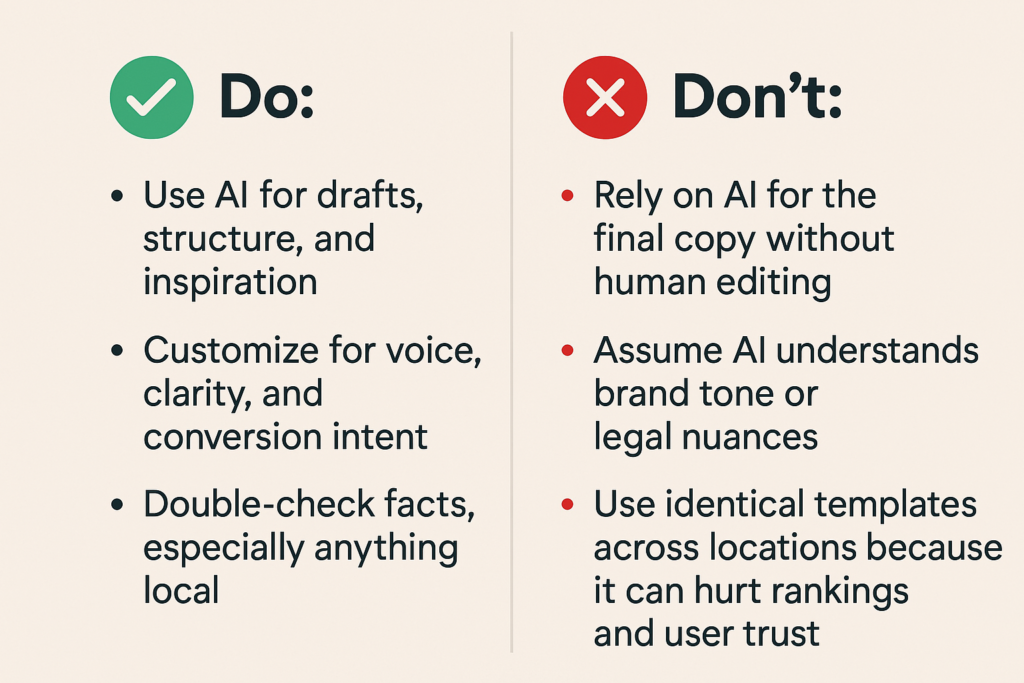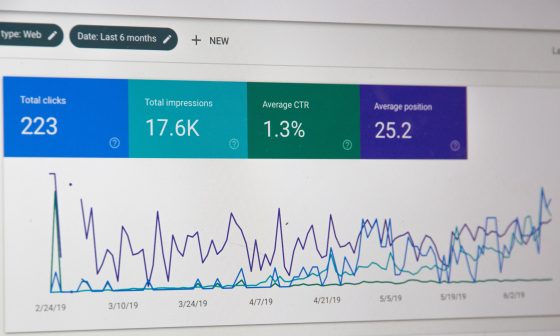Local SEO is more complex than ever. Your listings are scattered across platforms, reviews never stop, and algorithms keep shifting. Trying to manage all of it manually slows you down and holds your results back.
AI gives you control. It checks your listings, analyzes reviews, writes local content, and spots problems before they hurt performance.
With the right tools, you move faster, make smarter decisions, and run stronger local campaigns. AI helps you cut through the noise and actually get things done.
Why AI Matters in Local SEO Today
Search engines are changing fast. With things like Google’s Search Generative Experience and AI overviews, old-school tactics like keyword stuffing just don’t work anymore. It’s all about intent, context, and local relevance.
AI helps you figure that out. It digs into behavior patterns, search history, and location data to show what local customers actually want. You’re not guessing but rather working with real insights about when people search, where they’re coming from, and what results they expect.
Proximity, relevance, and prominence still matter, but AI helps you sharpen all three. It picks up on intent in long-tail keywords, recommends better content formats, and flags what’s missing in your local strategy.
If you’re handling multiple clients or locations, this kind of intel turns your SEO from reactive to focused and strategic. You’re not just keeping up; you’re staying ahead.
Automating Local Listings and Data Consistency
Keeping business listings accurate across platforms is one of the biggest time sinks in local SEO. One wrong phone number or outdated address can tank your rankings, confuse potential customers, and cost you leads. Now imagine dealing with that across dozens or even hundreds of directories—it adds up fast.
Here’s how AI takes the pressure off agencies and streamlines listing management:
- Instant NAP audits – Find and fix name, address, and phone number issues across platforms in minutes.
- Real-time updates – Sync accurate info everywhere without the manual hassle.
- Performance-based prioritization – See which platforms actually drive results, and focus your efforts there.
- Auto-tagging and enrichment – Add the right categories, services, and keywords using top-performing local data.
Instead of constantly patching listing issues, you get a clean, consistent local presence that’s easier to manage and built to perform.
Smarter Keyword Research with AI Tools
Smarter keyword research starts with AI. Traditional methods still work, but they’re slow and often miss the local nuance that actually drives results. Sifting through spreadsheets and switching between tools eats up time you don’t have.
AI speeds things up and brings context.
Instead of just handing you generic keywords, it surfaces long-tail and hyperlocal terms that match how real people search. You get phrases like “best pizza near Greenpoint dog park” instead of “pizza Brooklyn.” These hyper-specific searches are where the real conversions happen, and AI helps you find them fast.
It also makes competitive research less of a grind. AI shows you what your competitors rank for, where the gaps are in your content, and which keywords have the best shot at driving traffic and conversions. You get insight that actually moves the needle without wasting your day digging for it.
Local Content Creation at Scale (Without Sacrificing Quality)
Producing high-quality local content across multiple service areas is tough. It takes time, drains resources, and often ends up inconsistent across locations.
AI changes that. It gives you solid first drafts for blog posts, landing pages, and FAQs customized for each neighborhood so your team can spend less time starting from scratch and more time fine-tuning for quality and performance.
Need 20 local landing pages? AI builds the bones in minutes. It pulls in location-specific data, keywords, and service info so you’re not stuck duplicating work. Once you add your team’s voice, SEO know-how, and polish, you’ve got content that hits hard without draining your crew.
And if your team is juggling multiple projects at once, staying on top of time spent is key. These weekly timesheet templates by Resource Guru can help you track work across clients and locations so your workflow stays efficient and your team doesn’t burn out.
Quick Do’s and Don’ts for Using AI in Content Creation
Here’s a quick checklist to keep in mind when you use AI for content creation:

Used right, AI helps you publish faster, keep quality high, and stay relevant in every local market you serve.
AI-Powered Review Monitoring and Response
Online reviews are one of the biggest trust signals in local SEO. But keeping up with them across Google, Yelp, Facebook, and other platforms can eat up your team’s time fast.
AI helps you stay on top of it all without drowning in the details. It scans through massive volumes of reviews, picks up on trends in sentiment, and flags what customers keep mentioning good or bad. You get a clear snapshot of what’s working and where you need to step in, without combing through every single comment.
It also helps you respond faster. AI can draft replies that match your brand tone and cover common review types, so your team doesn’t have to start from zero each time. You stay responsive and consistent while freeing up time for the reviews that actually need a human touch.
You still want someone to look over the replies, especially for sensitive or negative feedback, but AI handles the heavy lifting so your team can focus on what matters.
Video Marketing Gets Smarter with AI
Video is becoming a key player in local SEO. It grabs attention, builds trust, and helps businesses stand out in search. But for agencies managing multiple clients, producing video at scale is tough.
AI makes it easier. You can now auto-generate transcripts, add subtitles, and repurpose video into blog posts, reels, and social snippets without starting from scratch every time. That means better accessibility, stronger SEO, and more content mileage with less effort.
Want to launch local video ads without hiring a crew? AI avatars and text-to-video tools have your back. You can create custom clips for different neighborhoods or services without blowing your budget.
And if you want to track real-world engagement, just drop in a QR code. A tool like Uniqode’s QR code generator for tracking shows how many people scanned your video, when, and where. You get clear data on what’s working so you can tweak and scale with confidence.
AI + GMB Optimization
Google Business Profiles (formerly GMB) remains one of the most important tools in local SEO. But if you’re managing listings for multiple clients or locations, keeping them optimized manually is a serious time suck.
AI makes that job faster, smarter, and way more efficient.
Instead of guessing which categories or services to include, AI looks at what’s working for top competitors nearby and suggests the best setup for your clients. It pulls from real data to recommend categories, keywords, and service options that match both search behavior and the business itself.
AI also helps you keep listings fresh. You can auto-schedule Google Posts and Q&A updates based on seasonal trends, local events, or trending searches so your clients stay visible and relevant without someone on your team having to babysit every profile.
With AI, you can boost visibility, tighten up your strategy, and spend less time buried in dashboards.
Building AI into Local SEO Workflows (Without Losing the Human Touch)
AI can unlock serious efficiency and scale for local SEO agencies, but it needs to be implemented with care. That means pairing automation with human oversight and making sure your team understands both the tools and the SEO fundamentals that still matter.
A solid workflow might look like this:
- Audit: Use AI to scan listings, flag NAP inconsistencies, and benchmark competitors.
- Strategy: Pull insights from AI tools to guide category selection, content topics, and review response planning.
- Content: Generate first drafts of landing pages, blog posts, or review replies, then refine for tone, clarity, and brand alignment.
- Listings: Auto-update business information across directories and schedule timely GMB posts. Synup’s smart AI helps you do just that.
- Reporting: Use AI to surface trends, summarize results, and identify what needs attention next.
- Documentation: Once your workflow is dialed in, tools like Supademo SOP Generator can turn it into step-by-step tutorials for your team, ideal for onboarding or keeping everyone aligned.
Other useful tools include ChatGPT, Surfer SEO, Jasper, and AI-powered local platforms that help automate listings, content, and reputation management. These tools allow your team to move faster without sacrificing quality.
A Note on Ethics and Accuracy
AI is powerful, but it’s not perfect. Left unchecked, it can miss details, misrepresent locations, or produce content that sounds robotic or generic. Google still penalizes low-value and duplicate content even when it’s AI-generated. That’s especially important for local pages, where accuracy and authenticity matter most.
Use AI to speed things up, not to skip steps. Let it handle the heavy lifting, but make sure a human is always there to guide, review, and polish. That’s how you get real results.
Conclusion
Winning at local SEO isn’t about using every AI tool out there. It’s about choosing the right ones that actually fit your workflow and improve your results.
Start small. Automate listings, track review sentiment, or create content for a few target locations. See what works, refine your process, and build from there.
AI delivers the most value when it’s backed by strategy and smart execution. It gives you speed, insight, and consistency without taking the human out of the process.
If your team wants to simplify location marketing and scale without the chaos, AI-powered platforms are a solid place to start.


